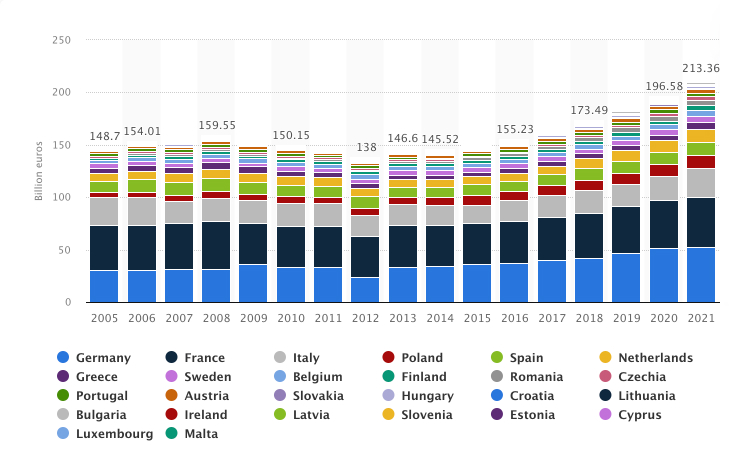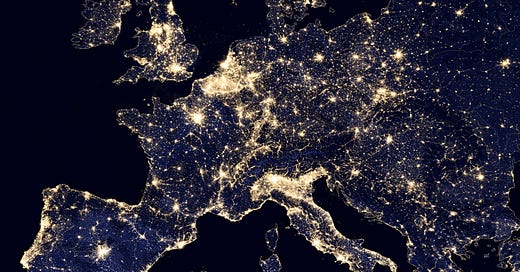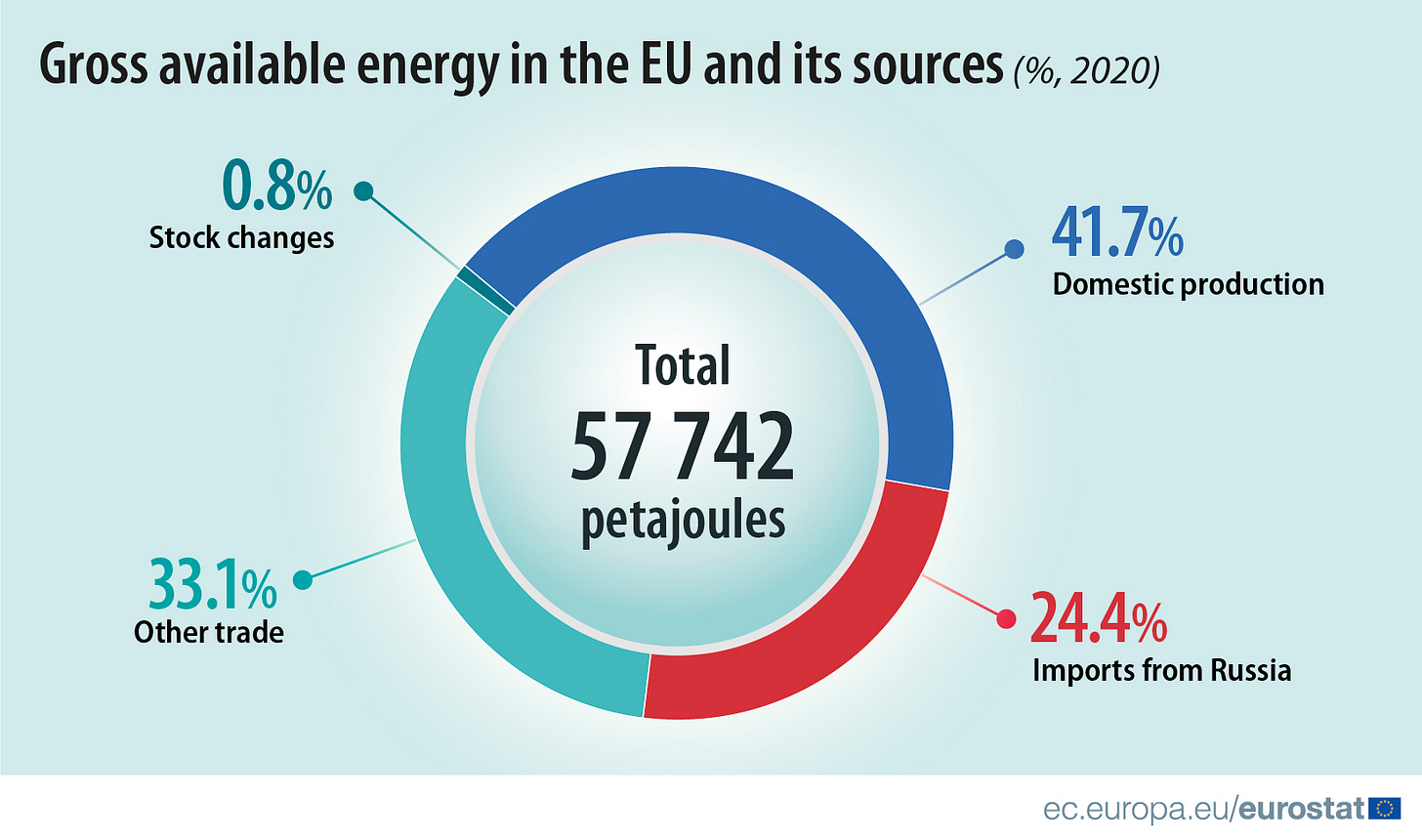The European Union: Federalization or Irrelevance
"Your future is whatever you make it, so make it a good one." — Dr. Emmett Brown
The importance of building a tripolar world
We live in a bipolar world, dominated by the United States and (to a lesser extent) China. Fundamentally, this is because the US and China have:
Large populations of 330M and 1.4B, respectively.
Large economies. GDPs of $23T and $17T, respectively. (Although the latter is disputed.)
Large industrial bases, especially China. See for example Chinese shipbuilding capacity, a good proxy for industrial capacity broadly.
Strong tech industries, especially the United States.
(Enabled by the above points) The strongest militaries in the world.

In a realist world, the above points are what give a state power on the world stage and enable it to promote its interests and impose its values on other states, for better or for worse.
Now, let’s take a look at the European Union:
A large population of 450M.
A large economy of $18T.
A historically strong, now moderate industrial base.
A well-educated, scientific populace, which used to translate into a strong tech industry, but has been faltering in recent decades.
A world-class military when combined.
There are two different conclusions one can draw from the above points. The first is that Europe is a declining power whose time has passed; a defeatist point of view. The second is that Europe has the potential to be a superpower in the full sense of the word like the United States and China, but that it isn’t currently (except on the regulatory front) due to a few key issues:
The European Union isn’t a state, and in many contexts doesn’t yet act as a unified entity.
The European Union isn’t energy independent like the US and China, leading to high energy costs, in turn affecting the EU’s ability to build and maintain a strong industrial base.
Overregulation (see for example the European Sustainability Reporting Standard or the Artificial Intelligence Act), hampering the EU’s ability to create a strong domestic tech industry.
A fragmented market, further inhibiting the growth of domestic businesses.
The lack of a combined military.
The result of the issues mentioned above is that the union is ineffective in supporting the values that it stands for and acting in its own interest, for example in ensuring that its domestic businesses are able to grow to the size needed for international significance. The countries of the union individually do not carry enough weight on the world stage (perhaps with the exceptions of France and Germany), are handicapped by overregulation and fragmentation, and are largely dependent on foreign powers for energy (a notable exception is France). This is a problem if you don’t want to live in a world dominated by the US and/or China, or if you care about the future of Europe and its interests and values, such as freedom, European scientific & technological progress, environmental protection, democracy, and human rights.

The promise of federalization
The good news is that there is a solution to most of the issues above: federalization, or in other words, creating a unified European state.
A European superpower
As a unified entity, the European Union would immediately become a superpower in terms of population and economy, bringing with it a degree of international significance otherwise out of reach and enabling it to more effectively safeguard and promote its values and interests in a world dominated by the United States and China.
Reduced complexity and bureaucracy
A federalized EU would also be able to act more decisively and better execute on union-wide projects and initiatives — such as energy independence efforts — through reduced complexity and bureaucracy.
A major issue with the union currently is that any member state can veto any proposal, leading to legislative deadlock and an inability of the EU to move quickly. This would no longer be an issue in a federal EU. A proposal that addresses this issue has been put forward.
Further, the internal workings of the European Union could be simplified significantly in a federalized EU.
The EU currently consists of 7 main institutions, the most important of which are the European Commission (headed by Ursula von der Leyen), the European Council (comprised of the leaders of each of the member states), the European Parliament (the members of which are elected directly by the citizens of the union), and the Council of the EU (made up of ministers of the member states, and not to be confused with the European Council). The European Council determines the priorities and high-level direction of the union. The European Commission then proposes new laws, but cannot vote on them. The European Parliament, together with the Council of the EU, subsequently vote on which laws — proposed by the European Commission — are passed and which aren’t.
In a federal EU, the internal workings of the union could be simplified significantly. The European Council would likely no longer be required. The European Commission could be transformed into the executive branch under the president of the union. The European Parliament could remain as the Lower House or primary legislative body, and the Council of the EU could form the Upper House.
The ability to raise taxes
Adding to the above, federalization would enable the union to directly raise taxes, enabling it to more easily fund continent-wide initiatives, for example to counter the flood of state-subsidized EVs from China and protect Europe’s domestic EV industry.
The ability to raise taxes would also enable the union to better fund institutions such as the European Space Agency. (Side note: in 2022, the United States government spent $62B on their space programs, whereas the European Union spent $7B. Independent space access is already crucial for security as well as business purposes, and will become even more so in the future.)
A unified domestic market
The regulatory simplification associated with unification would also enable domestic businesses to more easily access the entire EU and grow to the size needed for global significance. In the United States and China businesses typically focus on expanding in their domestic market first before expanding internationally, and because their domestic markets are massive this enables those businesses to grow significantly more before needing to compete internationally.
The second largest military budget in the world
The combined military expenditure of the union would total $295B+, an amount similar to China’s military budget and second only to the United States. As a unified force, this would further enable the union to more effectively safeguard its values and interests, by reducing dependency on the United States and increasing negotiating power.

A more democratic union
The EU is currently an indirect democracy; there is no direct feedback mechanism between the leadership of the EU and its citizens. This leads to a disconnect in terms of values and priorities between the population and its (semi-elected) officials. In a federalized European Union, which would almost certainly take the shape of a presidential or semi-presidential republic as mentioned earlier, there would be a direct link between the citizens of the union and its leadership (i.e. if the leader of the union does not act in the interests of the populace, they will not be re-elected). This would be significantly more democratic than the current state of affairs, and help ensure that actions of the union’s executive branch are aligned with the interests of the citizenry.
An increased sense of unity
The act of choosing the president of the union, with the associated elections, would also help to create a deeper sense of unity and engagement amongst the citizens of the union.
On the loss of national control and the (fear of) loss of national identity
Of course, federalization would mean sacrificing a significant degree of control at the (current) national level, but member states would likely retain a higher degree of autonomy than you might expect.
For example, in the United States, the individual states retain significant power. States conduct all elections, even presidential elections, and must ratify constitutional amendments. So long as their laws do not contradict national laws, state governments can prescribe policies on commerce, taxation, healthcare, education, and many other issues within their state. (See: The relationship between the states and the federal government by Khan Academy.)
Further, regional identity, language and culture would be unlikely to meaningfully change for the foreseeable future, even in a federalized union. Citizens can and do identify with both the union as a whole, and their state simultaneously, and there’s no reason to believe that this would significantly change in a federalized EU.
The road to a federalized European Union
Federalizing the European Union will be a complicated task and is probably best achieved incrementally. The most common objection raised by those opposed to it is the one mentioned above: the loss of national control and the (fear of) loss of national identity. But 44% of all Europeans are already in favor of a federal EU, and among younger generations this number is even higher.
Further, a unified Europe is not in the interest of the United States and China, because individually the member states are easier to influence, have a higher degree of dependence on the US and China and don’t pose a threat militarily. A fragmented union also means a slower and less decisive Europe, and less competitive EU businesses.
However, as explained above, the degree to which control and regional identity would be lost tends to be overestimated, and federalization is a necessary and net positive trade-off to ensure that Europe remains independent, relevant, prosperous and able to defend its interests and values in the future. In other words, given the choice between a European superpower and a future of irrelevance, which do you prefer?
A crucial and promising first step in the direction of a federal EU is the move to qualified majority voting mentioned earlier. Let’s hope it is successful.






